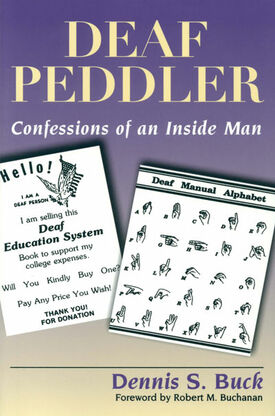
Deaf Peddler
Confessions of an Inside Man
First Edition
Description
In airports and train stations it is not unusual for waiting passengers to be approached by a person who will hand out a brochure or trinket, then indicate that he or she is deaf and ask for payment, anything they can afford. In many instances, the travelers feel pity for the poor unfortunate and dole out a dollar or two, yet most are utterly unaware that these pitiful beggars earn hundred of dollars this way in a matter of a few hours. Dennis Buck knows this unique form of panhandling intimately because, despite holding a degree in computer science and receiving Supplemental Security Income (SSI) and Social Security Disability Insurance (SSDI), he was a deaf peddler for 11 years.
In Deaf Peddler: Confessions of an Inside Man, Buck unveils all of the ins and outs of exploiting his “disabilities” to earn easy money. Buck details the day-to-day life of a deaf peddler, including where to go to make the most money in the least time (airports with their constant transient clientele, malls on weekends, and fast food restaurants), how to live on the cheap (wait for people checking out to leave their motel rooms, then sneak in to use the shower), and how to live well when business is good. He also explains how he organized his rounds using a spreadsheet program.
Deaf Peddler also provides a historical perspective on deaf peddling as a way for under-educated deaf people to make a living when jobs were hard to find, wages were low, and Social Security did not exist. The “no good” life served as the rationale to many deaf people for peddling, but many more in the Deaf community deplored their actions, and the National Association of the Deaf campaigned to discourage this behavior that reinforced deaf stereotypes. Buck abandoned peddling himself for this reason, but he points out that deaf peddling survives today, frequently in the highly exploitative form of rings of deaf workers completely controlled by oppressive deaf and hearing overseers. Deaf Peddler presents in engaging fashion a little-known cultural phenomenon that offers a revealing turn on the general issue of panhandling in our society today.
Reviews
"The thought of an educated deaf individual becoming a peddler has always been a sad image in the minds of educators and informed members of the deaf community. Buck, deaf from birth and wheelchair bound since college, tells about his life, not necessarily in chronological order but in the context of the history of the deaf peddler. His courage during physical rehabilitation from a motorcycle accident matches his gutsy approach to learning how to peddle and how to handle competition in airports. Moreover, Buck’s ideas about designing deaf communication brochures and about working airport locations are quite creative. Because peddling was more lucrative than his paying jobs and because he needed extra cash while going to graduate school, Buck continued this practice until he decided that his self-esteem was more important than money. His final line on the financing of his book tells it all: 'Money given under the false notion that deaf people can’t, financed a book telling everyone yes, they can.'"
— Nancy McCray, Booklist
"IT’S A LIVING: Not all techies make their profits on the job. Dennis S. Buck, a deaf computer programmer (who also happened to be in a wheelchair and whose boss deemed him unpromotable) supplemented his $8-an-hour wage the old-fashioned way: peddling sign-language cards in airports and shopping malls around the country. At Chicago’s O’Hare International Airport, he earned $750 to $1,000 a weekend.
At first proud to make money off of his deafness, Mr. Buck eventually grew tired of evading airport police and supporting a harmful stereotype. He decided to get a master’s degree and, though he didn’t quit it cold turkey, started writing about peddling to gain some distance. He last peddled in December 1997, and now works as a Web developer for AT&T."
— The Chronicle of Higher Education